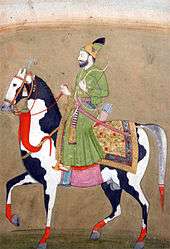
Guru Gobind Singh with his horse
Guru Gobind Singh (22 December 1666 – 7 October 1708), born Gobind Rai, was the tenth Sikh Guru, a spiritual master, warrior, poet and philosopher. When his father, Guru Tegh Bahadur, was beheaded for refusing to convert to Islam, Guru Gobind Singh was formally installed as the leader of the Sikhs at age nine, becoming the tenth Sikh Guru. His four sons died during his lifetime in Mughal-Sikh Wars – two in battle, two executed by the Mughal army.
Quotes
- Govind Rai, the tenth and last guru (1676 — 1708) and the only son of Tegh Bahadur, was a man of whom it had been prophesied before bis birth that ‘’he would convert jackals into tigers and sparrows into hawks." He was not the person to leave his father’s death unavenged. [...] Govind steadily drilled his followers, gave them a distinctive dress and a new oath of baptism... “Mother dear, I have been considering how I may confer empire on the Khalsa. ’ ’ And, again, “I shall make men of all four castes lions and destroy the Mughals.’’
- Jadunath Sarkar, The History Of Aurangzib Vol.III Second Edition, p 313, 316
- Arun Shourie quotes Govind Singh as declaring: 'Let the path of the pure [khâlsâ panth] prevail all over the world, let the Hindu dharma dawn and all delusion disappear. (...) May I spread dharma and prestige of the Veda in the world and erase from it the sin of cow-slaughter.'
- Arun Shourie, quoted in Elst, Koenraad (2002). Who is a Hindu?: Hindu revivalist views of Animism, Buddhism, Sikhism, and other offshoots of Hinduism. ISBN 978-8185990743
- Though Govind Singh is considered as the founder of the Khalsa order (1699) who 'gave his Sikhs an outward form distinct from the Hindus', he too did things which Sikh separatists would dismiss as 'brahminical'. As Khushwant Singh notes, 'Gobind selected five of the most scholarly of his disciples and sent them to Benares to learn Sanskrit and the Hindu religious texts, to be better able to interpret the writings of the gurus, which were full of allusions to Hindu mythology and philosophy.'
- Khushwant Singh, K. Elst, quoted in Elst, Koenraad (2002). Who is a Hindu?: Hindu revivalist views of Animism, Buddhism, Sikhism, and other offshoots of Hinduism. ISBN 978-8185990743
- Guru Govind Singh (...) sought inspiration from the deeds of martial Hindu deities like goddesses Chandi, Sri and Bhagwati.
- V.P. Bhatia, with reference to Khushwant Singh and Kuldip Nayar, quoted in Elst, Koenraad (2002). Who is a Hindu?: Hindu revivalist views of Animism, Buddhism, Sikhism, and other offshoots of Hinduism. ISBN 978-8185990743
- He was a versatile scholar who knew several languages, kept the company of learned Brahmins and composed excellent poetry on varied themes. He had been fascinated by the Puranic story of Goddess Durga particularly in her incarnation as Mahisamardini. He performed an elaborate Yajna presided over by pundits of the ancient lore and invoked the Devi for the protection of dharma. The Devi came to him in the shape of the sword which he now asked some of his followers to pick up and ply against bigotry and oppression.... Soon it became a hallowed tradition in many Hindu families, Sikh as well as non-Sikh, to dedicate their eldest sons to the Khalsa which rightly came to be regarded as the sword-arm of Hindu society.
- Swarup, Ram, & Goel, S. R. (1985). Hindu-Sikh relationship. (Introduction by S.R. Goel)
- One paper after another highlighted some quotes from contemporaneous writers in praise of Aurangzeb. These are easy to find, as he had the last say over their success or marginalization, even over life and death. On Stalin too, you can easily find many contemporary sources praising him, and then silly academics concluding therefrom that he can’t have been so bad. Thus, one of the sources was Guru Govind Singh’s Zafar Namah or “victory letter”. If you quote it selectively, you might think he was an admirer and ideological comrade of Aurangzeb’s. But the Guru was strategically with his back against the wall and had to curry favour with the man holding all the cards. So he wrote a diplomatically-worded letter and held his personal opinions to himself (and here is one case where personal relations must have trumped ideology). It is entirely certain, and academics cover themselves with shame if they cleverly try to deny it, that Govind hated Aurangzeb from the bottom of his heart. Aurangzeb was responsible for the murder of Govind’s father and all four sons. Any proletarian can understand that in private, Govind must have said the worst things about Aurangzeb. You have to be as silly or as partisan as a South Asia scholar to believe that the Guru meant to praise Aurangzeb. [...] I heard an “academic” describe how contemporary Hindi writers praised Aurangzeb, the dispenser of their destinies. Well, many eulogies of Stalin can also be cited, including by comrades fallen from grace and praising Stalin even during their acceptance speeches of the death penalty; but it would be a very bad historian, even if sporting academic titles, who flatly deduces therefrom that Stalin a benign ruler. Govind Singh’s “Victory Letter” to Emperor Aurangzeb was, in all seriousness, included among the sources of praise, leaving unmentioned that Aurangzeb had murdered Govind’s father and four sons. Every village bumpkin can deduce that Govind hated Aurangezb more than any other person in the world, and that he was only being diplomatic in his writing because of the power equation. Academics laugh at kooks who believe in aliens, but it took an academic, no less, to discover an alien who actually admired the murderer of his father and sons.
- Elst, Koenraad. Hindu Dharma and the Culture Wars. (2019). New Delhi : Rupa.
External links
This article is issued from
Wikiquote.
The text is licensed under Creative
Commons - Attribution - Sharealike.
Additional terms may apply for the media files.